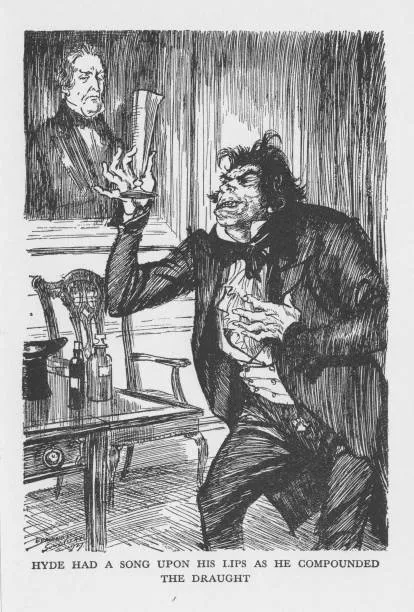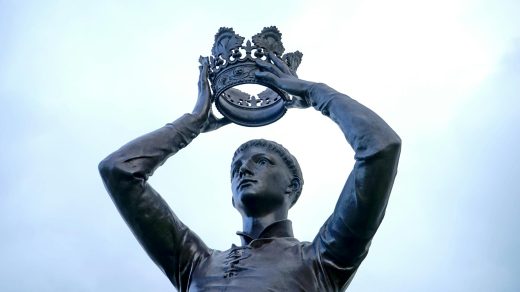As we are all aware, Dr Jekyll and Mr Hyde were fictitious Characters by Scottish Born, Robert Louis Stevenson who also wrote the famous book Treasure Island, a childhood favourite of mine and a game we played in the woods at the beach at Cramond in the early Seventies.
But the question is, who did Stevenson base the Jekyll character on? Well it was another man from Edinburgh called Deacon Brodie.
Deacon Brodie came from a well respected Edinburgh family, his Father was a high earner making fine cabinets and was a deacon in the incorporated rights of carpenters and other tradesmen, as well as a member of the Town council. Young Deacon was to follow in his Fathers footsteps and end up the Deacon himself in 1781. When Deacons father died he was left a massive fortune as well as his family home in the Lawn Market in the Centre of Edinburgh.
Deacon Brodie rubbed shoulders with all Edinburgh s elite and became a member of the exclusive Cape Club a high Society Club in Edinburgh. So this part of Brodie’s life took care of the Jekyll side of Stevenson’s character but what about the Hide part? Brodie was a massive gambler placing lots of money on “cock fights” and was also renowned for lingering in dark streets after binge drinking, amongst many dubious characters.

He also had many mistresses with many offspring, this would have been very expensive so maybe that’s why he turned to crime? Or as some say it may have been the “Hyde” part in him?
For a long time his crime was very successful, night-time robbery, as he was able to clay copy all his victims keys to access their property, and because he was well respected by his peers he was never under any suspicion. Can you imagine what he must have felt like when he was called into a Town Council meeting to discuss the high rate of burglaries in the area?
His confidence must have grown as he took on three accomplices from his drinking dens and naturally Brodie was the “ringleader”
Many things were stolen including the mace from Edinburgh University! But when they stole lots of silks from a famous clothier, there was a pardon put out to anyone who were accomplices in the thefts.
In a Bungled attempt at the excise office, one of the accomplices named Brown gave information to gain his free pardon from the robbery at the Excise office. The other accomplices were arrested but Brodie still remained above suspicion and tried many times to visit his accomplices in prison to make sure they did not turn him in to the Police.
Failed attempts pushed Brodie into leaving the City. A leading newspaper of the time offered a £200.00 reward for the information regarding Brodie’s whereabouts that sum of money would be the equivalent of 30 thousand pounds in today’s money so it was a healthy reward.
A very graphic description was put out for Brodie which covered him to a “T”, Brodie managed to escape to Holland hoping to catch a ship to America and his freedom!Alas, for Brodie he sent some letters home making it easy for the authorities to trace him, he was finally brought home for trial.
Brodie and the first accomplice went on trial based on evidence of the other two accomplices, in 1788 both were found guilty and sentenced to hang. A famous agent of the infamous Robert Burns the poet, wrote about the trial, Brodie sent an appeal to the Lord Provost of Edinburgh to stop his hanging and instead ban him to Botany Bay were all criminals who did not receive the death penalty were sent.
After 34 days in captivity Brodie was led to the scaffolding, erected outside St Giles cathedral minutes away from his home. Four of Brodie’s friends were present at the hanging to take his body away after, Brodie was well presented at the day of his death. Ironically He had died on the very gallows He had designed while sitting on the City Council.
The exclusive club he was once a member of membership book had a hand drawn picture of Brodie hanging from the gallows, with words, “for robbing the excise office” inscribed, a succinct last comment to mark the demise of the Original Jekyll and Hyde.
JEKYLL AND HYDE.




Someone necessarily help to make critically posts I might state.This is the first time I frequented your web page and thus far?I surprised with the research you made to create this particular put up amazing. Great activity!
I love it when people come together and share opinions.Great blog, stick with it!
Thank you a lot for sharing this with all of us you really recognize what you are speaking about! Bookmarked. Please also discuss with my site =).We may have a hyperlink alternate agreement among us
awe thank you friend, please come again.
thank you.
thanks, please leave your link.
Ooooh. I do love poetic justice. Great that he designed the mechanism for his own demise Billy. Have a good Sunday. Allan
hahaha what comes around goes around eh pal, thanks Allan…have a great week.